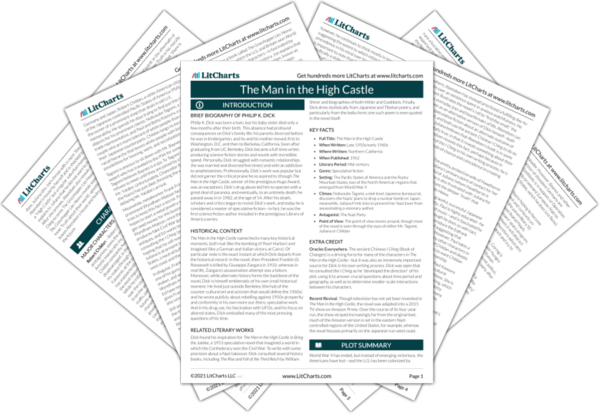Prejudice and Power
The Man in the High Castle imagines an alternate history in which the Allied Powers (namely the U.S. and Britain) lost World War II. Though it takes place entirely within the former United States, America has now been colonized in the east by the Nazis and in the west by the Japanese. This colonization has made the white characters under Japanese rule second-class citizens: they live in segregated neighborhoods, have limited job opportunities, and face…
read analysis of Prejudice and PowerHistory vs. Daily Life
The Man in the High Castle is set in alternate universe, one in which Germany and Japan won World War II and split North America between themselves. It follows, then, that many of the novel’s characters, reeling from the fallout of war and colonization, conceptualize time in terms of global political events. Additionally, this kind of historical thinking is a crucial feature of Nazi ideology, which shapes and threatens the lives of everyone living in…
read analysis of History vs. Daily LifeAuthenticity vs. Originality
In the alternate reality presented in The Man in the High Castle, Germany and Japan have won World War II and colonized the United States. In the Japanese half of the country (the Pacific States of America, or PSA), Japanese settlers highly prize American “antiques”—from valuable Civil War guns to seemingly throwaway milk bottle-tops. As the antiques market grows, more and more forgeries are being discovered—and the fakes themselves are usually functional and beautiful…
read analysis of Authenticity vs. Originality
Agency vs. Chance
In The Man in the High Castle, various characters try to alter history, whether that means assassinating a prominent writer or intervening in an important election. It follows, then, that many of these people believe that they have a great deal of agency over their lives. But on the other hand, some of the protagonists—particularly Jewish artist Frank Frink and Japanese bureaucrat Nobusuke Tagomi—frequently consult the I Ching, an ancient Chinese oracle…
read analysis of Agency vs. ChanceMoral Ambiguity and Forgiveness
Throughout The Man in the High Castle, the characters must make difficult moral decisions: Mr. Tagomi, a mild-mannered Japanese bureaucrat, is forced to kill two men to save another, and Baynes, a dissenting German spy, must join forces with a repugnant Nazi to stop a horrific nuclear war. As Tagomi, Baynes, and the other characters make moral choices, they are forced to reckon with the impossibility of morally pure behavior in a…
read analysis of Moral Ambiguity and ForgivenessArt, Perspective, and Truth
The characters of The Man in the High Castle have startlingly different perspectives. Juliana Frink, a Judo instructor and the one-time wife of a Jewish man, sees the world very differently from Hugo Reiss, a Nazi ambassador. Likewise, prejudiced antiques salesman Robert Childan has little in common with pensive bureaucrat Nobusuke Tagomi. Yet even as each character experiences a dramatically different reality (shaped by his or her unique background, nationality, and worldview)…
read analysis of Art, Perspective, and Truth






